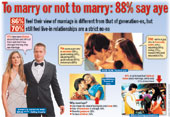 |
More and more marriages may be on the rocks, but Calcutta?s singletons still eagerly await matrimony. This old game though is being played by new rules
Heartbreak, separation, divorce. These could be the cause of many tears and considerable anger, but none of it is powerful enough to shoot down young Calcutta?s enthusiasm for the institution of marriage.
In a poll for Metro on Sunday, MODUS found that 88 per cent of respondents (men and women between the ages of 19 and 31 years) resoundingly embrace the idea of marriage, warts and all.
Which brings us to the reigning sensation of Indian publishing, Shobhaa De?s Spouse. The book that claims to reveal The Truth About Marriage has sold upwards of 22,000 copies in just over a month.
It?s no wonder, says celebrity author De. ?India is a marriage-obsessed society,? she says. But her motivation for writing a defence of what she considers a wondrous state of being tells of a critical shift in attitude. ?Marriage, now more than ever before, is under threat,? feels De.
And her prophecy is that matrimony will not survive in its current form. The institution has taken a beating and the ?marriageable? generation of today has taken the biggest blow.
Beauty and stability
With divorce becoming a part of everyday, everyman?s India, it doesn?t take radical eyes to see the truth in De?s words. Almost half ? 47 per cent of respondents ? report exposure to divorce among friends and acquaintances, and around one-third of this number admits to being rattled by the experience.
Around 86 per cent of the men and women polled do admit that their notion of marriage has changed from that of generations past.
But has the attitude changed enough to affect what men and women look for in a mate? Apparently not. Neither men nor women are straying far from convention, as their responses clearly reflect.
For men, looks are still important, and though education is top priority, they still don?t necessarily look for women who can fend for themselves. And 20 per cent want their woman to be ?simple?, whatever that means.
No matter how economically empowered the young Indian woman becomes (the main factor, experts agree, behind the revolution in marriage), she still is in search of the capable provider. Around 42 per cent of women concur that they want a man who is, above all, financially stable.
This has potentially dangerous implications, explains city-based counsellor Snigdha Gohain. ?A degree of financial independence is essential in any marriage.? Even if a spouse is dependent, she (or even he) must have some money that is wholly her own to spend without accountability.
That was also the advice De recently had for her all-woman audience in Calcutta: ?Everyone in this room must do something for her own money? Make pickles or papads or whatever.?
Marriage still does signify a blow to financial freedom for some women. Of the women who claimed in the poll that they did not want to tie the knot at all, 50 per cent cited loss of career opportunities as a leading cause of their reluctance.
The C factor
With pre-marital romance becoming the norm rather than the exception in urban India, a degree of caution is advised. ?Love marriages are collapsing faster than arranged ones,? observes city-based psychiatrist Suranjana Ganguly. ?Couples come in with more expectations, and often progress to marriage without putting much thought into it,? she adds.
Gohain agrees. ?Remember, in a love match, the feelings are already old and familiar. In an arranged marriage, the couple is just setting out and exploring emotions.?
De is also a staunch supporter of parents finding their children a life partner. ?In its current form, arranged marriages can work very well,? she stresses. The system she describes ? parents introducing children to someone he or she might like ? is nothing like the conventional norm and is almost like a blind date. Instead of friends doing the matchmaking, it is the folks.
How much has actually changed is still debatable: pressure from parents is still more of a pain, with 63 per cent of women reportedly having arguments at home about whether they should get married or not, though only 17 per cent of men have had a similar experience.
Regardless of how the couple comes together, without the C-word ? commitment ? failure is certain, points out De. Ganguly adds that if marriages are changing ? and they already have ? it is mainly because the concept of permanence has changed. Faced with problems, people are looking for escape routes. And this isn?t necessarily bad. ?We often counsel people to get out of damaging marriages,? she adds.
Need and deed
There is also a significant number among the upwardly mobile who question the validity of the age-old institution in modern times. ?It is just not natural for two independent people with their own worlds to spend their entire lives with one person,? feels one city-based 26-year-old marketing executive. ?Marriage has only survived for so long because women were financially and socially dependent on its sanction. Now, this need is gone.?
Whether man is by nature monogamous has been the subject of continuous debate and research for years. But it is the most stable option we have. ?And man craves stability,? stresses Ganguly. ?Forget about the couple ? marriage provides support for the whole extended family, for the care of children and the elderly.?
De argues that marriage has succeeded through the centuries, and no feasible option has really been offered. Experiments with free love and open marriages have not taken off. But at that same time, changing conditions demand a more pragmatic attitude.
Marriage is a commitment for only those who want to spend the rest of their lives with one person, and who are willing to put in the effort to keep it that way.











